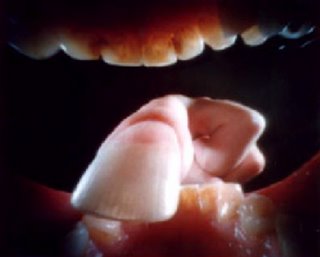People have accused me of being "crypto-Lutheran" or just plain "overly dark" as though the ideas were something of my own creation. The theology that I espouse is to be found first and foremost in the Bible, and thereafter in Augustine, and further in Lutheran, Jansenist, Cranmerian, and Calvinist traditions. They are not Zahlian in origin, and they are not uniquely Lutheran (i.e., unlike, say, certain theological ideas about the Law and its function to which I also am an adherent).
I couldn't wait to get home to Sewickley to grab this book off the shelf! I hope you'll enjoy them as much as I have/do. -- JAZ
from "God Owes Us Nothing" --
(pp. 46-47) "Reduced to their ideological basics, the clash between the two images of the human condition, and consequently two educational principles, can be thus expressed: is human nature an implacable foe of God, and eternal, contemptible rebel that must be destroyed, or is it a somewhat polluted object which could be tamed, ennobled, and set straight?"

(p. 109) "The standard message of the Catholic Church [and most evangelicals?] to the faithful is: God wants to help you and indeed does help you to be worthy of salvation, but you have to help him, to put forth your will and make an effort if you are to be saved. We are capable, according to this teaching, of spurning divine aid or accepting it by a free act of assent. And since God refuses his assistance to no one, ultimately our salvation depends on us. This is the semi-Pelagian doctrine (at least as far as the so-called "synergy" is concerned, not necessarily in the sense that the first step towards conversion is taken by the human will alone, without the contribution of grace). A Catholic who believes that God gives some people irresistible grace, thus electing them to glory, and refuses aid to others by his sheer will, irrespective of their own merits, is probably a rarity today. And it would be extraordinary to meet a Catholic who is convinced that innocent infants, if they die without baptism, will suffer everlasting torment in hell. In fact, even the hope that ultimately everyone will be saved does not seem to some inconsistent with Christian dogma, the condemnation of Origen notwithstanding; and the theory of apocastasis -- including even the restoration of demons -- was preached, apart from Origen, by a number of fathers, like Gregory of Nyssa and Gregory of Nazianzus. Even the fact that the sacrament of penance is usually referred to as the sacrament of reconciliation shows the prevailing belief in 'cooperation,' in the full sense of the free will acting together with divine help in meritorious acts. In spite of all the condemnations of Pelagian and semi-Pelagian teaching, and in spite of the great popularity of Augustine's writings among today's active Catholics, the cornerstone of his theology of predestination seems to have been nearly lost."
(p. 139) “The words ‘even though it is true,’ etc., are both Cartesian and Augustinian. They do not suggest, absurdly, that for some people there is a logically sound way from the sky and the birds to God, whereas it is closed to others. There is no logically sound way. But a believer perceives God everywhere. It is Cartesian to say that there is no reliable reasoning from the sky and birds; it is Augustinian to say that once you have faith you see God in the sky and birds. Since it is a matter of faith, the sky and birds are useless in convincing the skeptics and unbelievers; they won’t be convinced, and rightly so.”
(p. 147) "It is our will that directs our mind toward this or that, depending on the pleasure we find in either. Therefore conversion is a matter of healing the will, not of mending the intellect."
(p. 149). "Pascal displays a sad resignation in the face of the post-Cartesian universe: birds or sky no longer give testimony of God's omnipresence. Pascal's almost obsessive preoccupation with God's absence is well understandable; that is what religion is ultimately about apart from grace."
(ibid) "God's concealment confirms the truth of Christianity, because no other religion says that God is hidden."

(pp. 159-160) "...once we know from the divine word the crucial facts of man's destiny -- the history of the Fall and of redemption -- we can understand all the things that would otherwise seem depressingly unintelligible and revoltingly absurd: all forms of human misery, suffering, the very frailty of reason, the futility of our aspirations, struggles, persecutions, and poverty."
(p. 186) "Pascal's most urgent message to his contemporaries was: if you scratch the surface -- and not very deeply -- you will see that everybody is unhappy. The reasons for human misery are uncountable; but then there is perhaps only one: people have lost their ability to trust God and thereby to trust, to accept, and to absorb their own destiny. This makes them so vulnerable that the slightest failure produces in them a helpless despair. Our insecurity and anxiety are built into our very existence."
(ibid) "Those who seek God will find him, says Pascal, he even says that he who searches for God has already found him."
(p. 211) "It is clear that to Calvin grace is gratuitous, that it has nothing to do with human merit, that it is irresistible, that its distribution was decided eternally, that necessity is not compulsion, and that we may speak of human free will not as an ability to choose between good and evil but only in the sense that we always do evil when our own will is working and always do good when our will is propelled by grace. All this is perfectly Augustinian; all this is Jansenist doctrine."



2 comments:
JAZ,
Great quotes! Leave it to the extremely educated, agnostic, very-very-questioning Roman Catholics to articulate the truths of Christian faith so clearly. Thanks for sharing what you have learned.
As an aside, I think I called one of your posts crypto-lutheran - which was simply intended to identify your argument as tacitly Lutheran, though not obviously so. I for one think that it is precisely the doctrine of total depravity that makes the transforming power of the gospel such great news. At any rate, you are right; it is not Zahlian in origin.
Ever,
BFC
oh I love those. they're gonna be useful...
Post a Comment